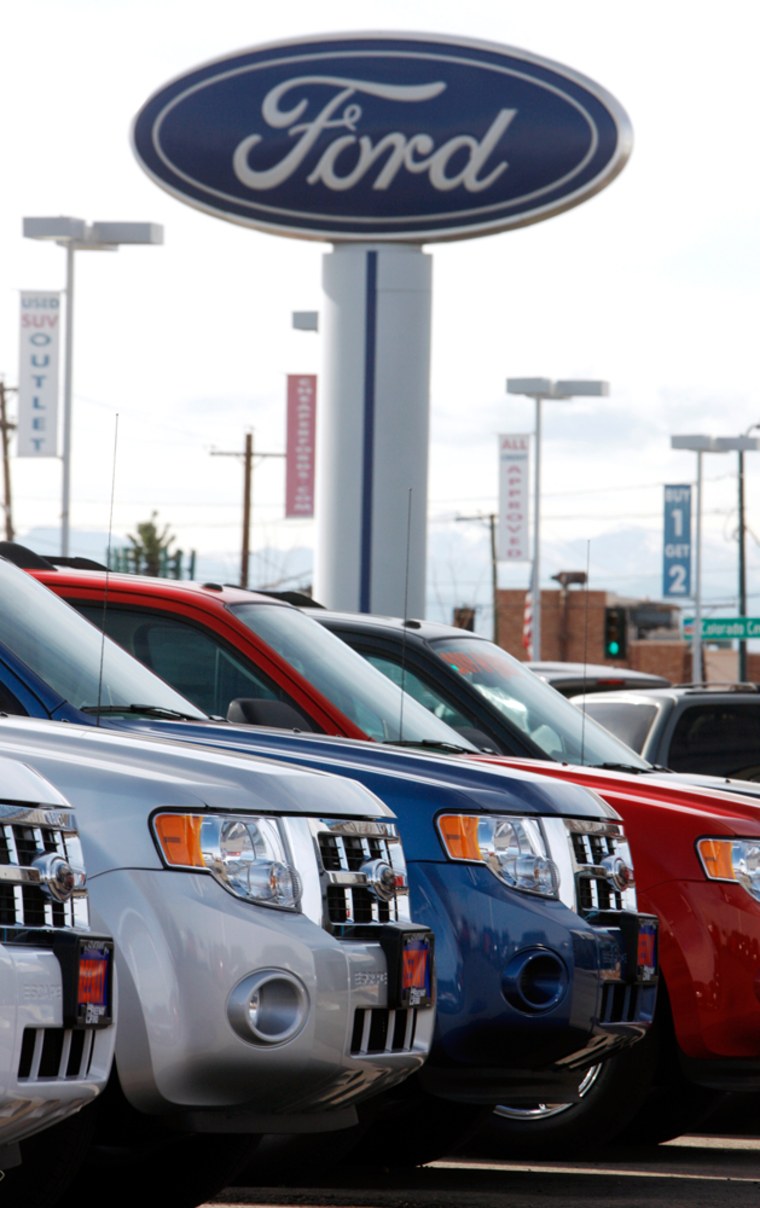It's not unusual for shoppers to get their money back when something doesn't work or fit. But now companies are throwing refunds at customers for a new reason: They've lost their jobs.
Relaxed mortgage or car payments and even a new suit are among the deals to be had for consumers who are unemployed or worried about losing their jobs. And marketing experts say these offers are anything but charity. They aim to preserve long-term relationships and kick-start the stagnant economy.
Here are some questions and answers about special employment-related deals.
Q: Who's offering some of the biggest deals?
A: Carmakers have been dangling discounts and 0 percent financing for months to draw people to their lots. Now some are breaking out employment-related guarantees.
On Tuesday, Ford Motor Co. and General Motors Corp. both announced temporary offers to cover some car payments for people who lost their jobs. And Hyundai Motor Co. said earlier this year it will allow buyers to return a vehicle within a year if they can't make the payments due to a job loss or disability.
For some unemployed homeowners, Citigroup Inc. has said it will temporarily lower mortgage payments to an average of $500 a month.
Q: There's no way I'll buy a car right now. Are there any smaller-scale deals out there?
A: There's a wide variety, depending on where you shop.
Drugstore operator Walgreen will offer free in-store clinic visits to the unemployed and uninsured for the rest of the year. Patients who lose their job and health insurance after March 31 will be able to get help for respiratory problems, allergies, and skin conditions, among other ailments.
Men's clothing retailer JoS. A. Bank Clothiers Inc. will refund the price of a suit if the buyer loses his job, and the customer gets to keep the suit — which can come in handy for job interviews. The deal applies to suits purchased during the company's $199 sale from March 16 to April 9.
The airline JetBlue, under its "Promise Program," is offering a full refund for hotel reservations and plane tickets to people who lose their jobs prior to their trips.
Last fall, the New Jersey Nets gave free tickets to unemployed fans who submitted their resumes. Now the basketball team is offering a full refund if fans who purchase 2009-10 season tickets before May 31 lose their job before that season starts next fall.
Q: What's the motivation here? Unemployed people seem to be the type of consumers retailers would avoid.
A: If you think some of these guarantees smack of desperation, you're right, to an extent.
Consumers have clamped down on spending, and businesses are getting somewhat desperate to fix that, said Jean-Pierre Dube, a marketing professor at the University of Chicago's Booth School of Business. One approach is to remove some of the risk that comes with making a purchase.
"What firms are effectively doing is trying to offer forms of insurance," he said.
They also want to preserve their customer base because they know the recession will end at some point, and they're willing to take a short-term loss to avoid losing business permanently.
Businesses also have become much more focused on understanding customers and their needs, said Eric Anderson, a professor at Northwestern University's Kellogg School of Management.
"Whether this is a token response or a real response, they're trying to make sure that they're listening to their customers," he said.
Q: Isn't it risky to offer full refunds based on a customer's employment or lack thereof?
A: Yes, and that worries Dube.
Companies that offer full refunds for a product failure or quality issue normally have a sense for how many people will take them up on that. But Dube thinks retailers are taking a chance with these employment-related offers because it's hard to budget for returns based on someone's job status — a factor they can't control.
Q: Why are consumers staying home?
A: It's the economy, stupid.
Many people either have seen a pay cut, lost their job or are worried about that happening. If those factors don't apply, they've probably seen a big drop in personal wealth — things like their home value or retirement savings.
That makes the consumer reluctant to spend, especially on expensive items like cars.
Q: Will these refund offers or payment breaks make consumers dust off their credit cards and resume shopping?
A: That's hard to say.
Businesses aren't the only ones trying to entice the consumer. Government stimulus checks and tax cuts also aim to spur spending. But the longer the recession lasts, the more motivation companies need to provide to attract business, said Brian Bethune, an economist with IHS Global Insight.
Each individual refund probably makes little difference on its own.
"But if you get enough things going on at the same time, then the whole point is to try to put a few warm coals together and get a fire," he said. "Once you spark a certain improvement in psychology, then suddenly you get some improvement.
"But it's a very difficult set of circumstances right now."
